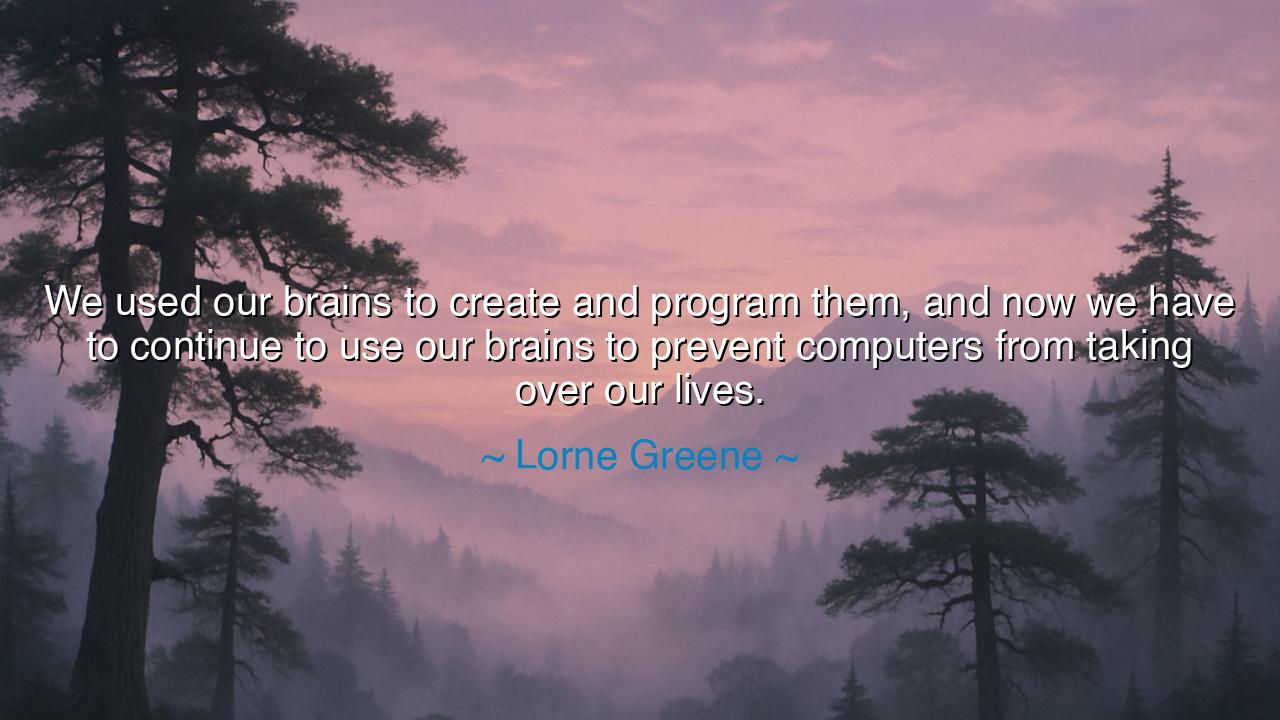
We used our brains to create and program them, and now we have to
We used our brains to create and program them, and now we have to continue to use our brains to prevent computers from taking over our lives.






“We used our brains to create and program them, and now we have to continue to use our brains to prevent computers from taking over our lives.” – Lorne Greene
In these wise and prophetic words, Lorne Greene speaks as one who beheld the dawn of the technological age and foresaw both its brilliance and its peril. His statement, simple yet profound, reminds us that the same human intellect that forged the mighty computer must remain ever vigilant, lest that creation rise to rule its creator. It is a warning not born of fear, but of responsibility. For every invention born from the mind of man carries both a promise and a peril—the promise of progress, and the peril of forgetting what makes us human.
When Greene says, “We used our brains to create and program them,” he honors the ingenuity that defines our species. The computer stands as one of humanity’s greatest triumphs—a tool that multiplies our strength, expands our vision, and bridges worlds once divided by distance and ignorance. Yet, he reminds us that this same power demands discipline of mind and wisdom of spirit. For tools have no conscience; they follow the hands that wield them. The true question is not whether the computer will grow powerful, but whether we will remain masters of our own minds in the presence of such power.
In the annals of history, we find echoes of this truth. Consider Victor Frankenstein, the scientist of Mary Shelley’s imagination. With genius and fire, he created life from the dead—only to be consumed by the very being he made. Shelley’s tale, though born in an age of candlelight, foretold the eternal struggle between creation and control. So it is with our machines: we gave them the power to think in patterns, to calculate beyond our measure, yet if we surrender our judgment, our empathy, our moral compass—they will become the Frankenstein of our own century, and we their frightened makers.
The danger that Greene warns of is not rebellion in circuits, nor machines that march against us—it is the slow surrender of the human will. Each day, we yield more of our attention to screens, more of our choices to algorithms, more of our memories to the cloud. We no longer ask, “What do I believe?” but “What does the data say?” The peril lies not in the computer’s strength, but in our weakness—the temptation to let it think for us, feel for us, and live for us. Thus, Greene’s voice calls across the decades: Remember your mind, for it is your crown and your compass.
Even in ancient times, the wise warned of this path. The Greeks spoke of Daedalus, the craftsman who built wings for himself and his son Icarus. But when Icarus soared too near the sun, the wax melted, and he fell into the sea. So too are we, in our digital age, ascending on wings of silicon and code. We must fly, yes—but with measure, with humility, with wisdom. For without them, we shall forget that our inventions are meant to serve us, not enslave us.
There is, however, hope shining within Greene’s words. For he does not say we are doomed, only that we must continue to use our brains. This is both a warning and an invitation. It calls upon us to be thinkers, not consumers; creators, not captives. To question the ease that numbs us. To seek balance between the digital and the divine. The brain that birthed the computer must also birth the ethics that guide it. The mind that built the machine must remain its guardian.
So, the lesson of Lorne Greene’s words is this: never surrender the throne of your own thought. Use the computer, but do not let it use you. Learn from it, but do not let it teach you to forget yourself. Let technology be your servant, not your sovereign. Each day, choose awareness over automation, wisdom over convenience, reflection over reaction. For the machines may know how to process, but only the human heart knows how to understand.
Thus, let these words be inscribed in the tablets of our age: “We used our brains to create and program them, and now we have to continue to use our brains to prevent computers from taking over our lives.” Let us honor the sacred gift of intellect that gave birth to every invention—and let us guard it as the flame that must never go out. For the future will not be decided by the power of our machines, but by the conscience of those who built them.






AAdministratorAdministrator
Welcome, honored guests. Please leave a comment, we will respond soon